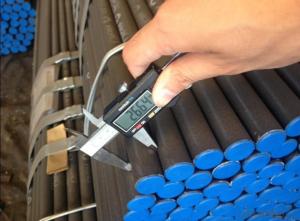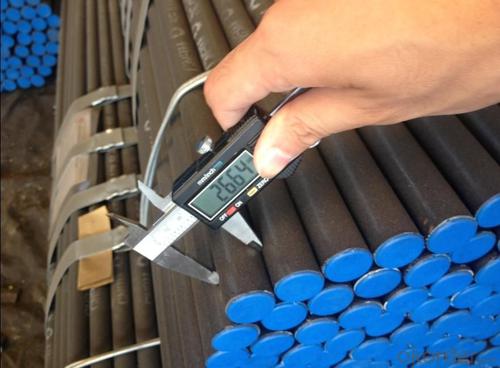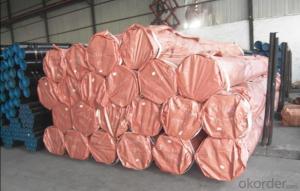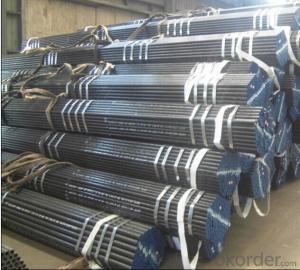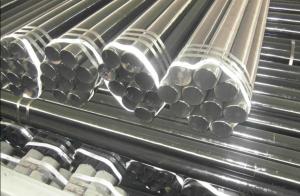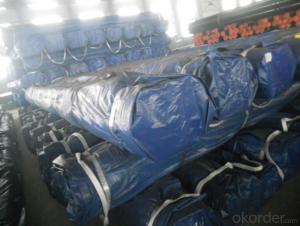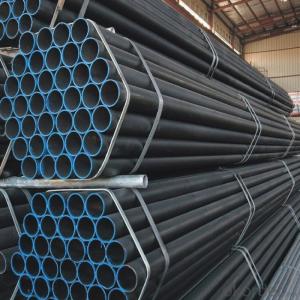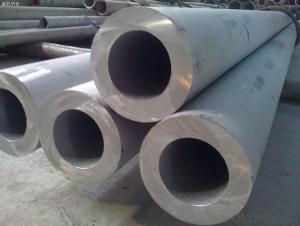Carbon black seamless steel pipe DIN17175 ST35
- Loading Port:
- Tianjin
- Payment Terms:
- TT OR LC
- Min Order Qty:
- 10 m.t.
- Supply Capability:
- 10000 m.t./month
OKorder Service Pledge
OKorder Financial Service
You Might Also Like
1. Commodity Name: Seamless steel pipe
2. Standard: API,GB,ASTM,ASME,DIN
3. Quality grade: 10#, 20#, A106B, A53B, API 5L B, Q235, Q345, ST37-2, ST 45, ST52.etc.
4. Dimension:
OD: 1/2"-24"
WT: 2.5-80mm, SCH10~SCH40~XXL
length: 5.8m,6m,8m,9m,12m
5. Technique: Hot Rolled/Cold Rolled/ Cold Drawn
6. application
carbon seamless steel pipes are widely used in gas, water and oil, transpotation;constructions;Bridge,highway,windows of model steel door; building materials;fences;heating facilities Fluid Pipe;conduit pipe,scaffolding pipe.etc.
7. Payment Terms: L/C D/A D/P T/T
8.packing and shipment
Packaged in bundles,as per customers' requirements, it can also bepackagesd as beveled ends, typed marking, black painting, plastic caps protection,woven bags packing
For 20" container the max length is 5.8m; For 40" container the max length is 12m. other options are available based on customer requests. Please discuss when placing orders.
9. Surface: painted with varnish;
10. Plastic caps at ends.
11. Tolerance: OD +1%/-1%
WT +12.5%/-10%
12. Chemical composition:
Models of Steel Pipes | Chemical Component | |||||||
Steel 20 (ASTM A106B) | C | Si | Mn | P | S | Cu | Ni | Cr |
0.17~0.24 | 0.17~0.37 | 0.35~0.65 | 0.035max | 0.035max | 0.25max | 0.25max | 0.25max | |
Steel45 (ASTM 1045) | 0.42~0.50 | 0.17~0.37 | 0.50~0.80 | 0.035max | 0.035max | 0.25max | 0.25max | 0.25max |
16Mn(Q345B) | 0.12~0.20 | 0.20~0.55 | 1.20~1.60 | 0.035max | 0.035max | 0.25max | 0.25max | 0.25max |
45Mn2 ( ASTM1345) | 0.42~0.49 | 0.17~0.37 | 1.40~1.80 | 0.035max | 0.035max | 0.3max | 0.3max | 0.30max |
- Q: What are the properties of steel that make it suitable for pipe manufacturing?
- Steel is an ideal material for pipe manufacturing due to its various properties, including high strength, durability, and resistance to corrosion and extreme temperatures. It can withstand high pressure and can be easily fabricated into different shapes and sizes, making it versatile for various piping applications. Additionally, its smooth surface ensures efficient flow of fluids and reduces friction losses.
- Q: Are steel pipes suitable for structural purposes?
- Yes, steel pipes are suitable for structural purposes. They are known for their high strength, durability, and resistance to various environmental conditions, making them ideal for use in constructing buildings, bridges, and other infrastructure projects. Additionally, steel pipes are versatile and can be easily modified and connected to meet specific structural requirements.
- Q: Can steel pipes be coated for additional protection?
- Yes, steel pipes can be coated for additional protection. Coatings such as epoxy, polyethylene, or zinc can be applied to steel pipes to enhance their durability, corrosion resistance, and longevity.
- Q: Is hot dipped plastic pipe steel?
- Hot dip pipe used in fluidized bed impregnation process, one-time into new anti-corrosion steel production process is the original film, plastic pipe or electrostatic nozzle replace (the products by physical treatment process)
- Q: What are the common problems or issues faced with steel pipes?
- Common problems or issues faced with steel pipes include corrosion, rusting, leaks, cracks, and blockages. Corrosion can occur due to exposure to moisture or chemicals, leading to a decrease in pipe integrity and potential leaks. Rusting is another common problem, especially in outdoor or wet environments, which can weaken the pipe and cause structural issues. Leaks can result from pipe corrosion or cracks, leading to water damage and potential pipe failure. Blockages can occur due to debris, scale buildup, or pipe collapse, restricting the flow of fluid or causing complete pipe blockage. Regular maintenance and inspections are necessary to identify and address these issues promptly.
- Q: Can steel pipes be used for underground geothermal systems?
- Yes, steel pipes can be used for underground geothermal systems. Steel pipes are commonly used in geothermal systems due to their strength and durability. They can withstand the high temperatures and pressures associated with geothermal energy extraction and distribution. Steel pipes also have good corrosion resistance, which is important when dealing with the underground environment and the various minerals and chemicals present in the ground. Additionally, steel pipes are versatile and can be easily joined and installed underground, making them a suitable choice for geothermal systems.
- Q: What are the different types of joints used to connect steel pipes?
- Some of the different types of joints used to connect steel pipes include butt joints, socket weld joints, threaded joints, flanged joints, and grooved joints.
- Q: What are the different coating options available for steel pipes?
- Some of the different coating options available for steel pipes include epoxy coatings, polyurethane coatings, fusion-bonded epoxy coatings, zinc coatings, and asphalt coatings.
- Q: What are the different types of steel pipe coatings for drinking water pipelines?
- There are several types of steel pipe coatings used for drinking water pipelines, including fusion bonded epoxy (FBE), polyethylene (PE), and polyurethane (PU) coatings. Each coating offers different advantages, such as corrosion resistance, durability, and smoothness, to ensure the safety and quality of drinking water.
- Q: How are steel pipes protected from damage during transportation?
- Steel pipes are typically protected from damage during transportation through various methods such as wrapping them in protective coatings, using foam inserts, securing them with straps or braces, and placing them in sturdy packaging materials to prevent any movement or impact. Additionally, pipes may also be stored and transported in specialized containers or racks specifically designed for their safe transportation.
Send your message to us
Carbon black seamless steel pipe DIN17175 ST35
- Loading Port:
- Tianjin
- Payment Terms:
- TT OR LC
- Min Order Qty:
- 10 m.t.
- Supply Capability:
- 10000 m.t./month
OKorder Service Pledge
OKorder Financial Service
Similar products
Hot products
Hot Searches
Related keywords
